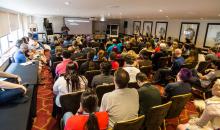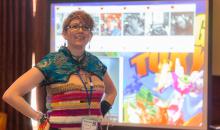
Academia and Humanities is about the relationship between geeky subjects and academic ones. We’re interested in academic studies of geeky media, in looking at geeky topics through the lens of academic disciplines, in research by and into fans, geeks, and the things they produce, and in demystifying academia and making academic research and academic topics accessible and interesting for everyone.
If that sounds broad, it’s because it is. Want to talk about theology in science fiction, archaeology in fictional worlds, the linguistics of Tumblr fandom, or how to use academic resources to write really awesome fanfiction? We’re here for that. Or pretty much anything else you can come up with, really.
Academia and Humanities Programme
Our talks, panels and workshops cover a swathe of academic geekery. Come and join in!
Journalism in the age of social media
Working in a variety of fields from geek culture news to political reporting, journalists Laurie Penny, Reni Eddo-Lodge and Gavia Baker-Whitelaw forged their careers in the age of new media. In this panel, they discuss how social media has influenced and shaped their work, including the rise of citizen journalism, the impact of hashtag activism, and the persistent problem of online harassment.
Speakers: Laurie Penny, Reni Eddo-Lodge, Gavia Baker-Whitelaw, Tanya Brown
Transformative Shakespeare: Fanfiction & Beyond
The works of Shakespeare are fundamentally transformative – he transforms us as we transform the plays. The flexibility of Shakespeare combined with his understanding for deep human truths has fired the imagination for 400 years. We will discuss how directors have brought us to reflect on our times, our politics, our history, our cultural assumptions (gender, race, sexuality and more) by their choices - for example, by casting women in traditionally male parts, setting plays in non-Western environments etc. We will also explore how writers have been inspired to extend the plays and the relationship between fanfiction and works like Rosencrantz and Guildenstern are Dead.
Speakers: Lisa Burscheidt, Ro Smith, Michele Howe
Transformative works and the colonisation of historical space, or How to think about historical fiction
Historical fiction is the orphan of genre criticism, with no substantial Anglophone critical tradition, and a low-to-invisible scholarly profile despite its expansive reach, popularity, and cultural penetration. Yet of all the major branches of genre fiction, it has always sat closest to the centre of what we would now understand as the poetics of fan fiction, going back at least to Greek myth's fictionalisation of the cultural memory of the Mycenaean world and its collapse as the first, and until recently the largest, megatextual system in the western literary tradition. Historical fiction is the original mode of fan fiction and always has been, long before we had the concepts of fan culture and transformative works to describe how makers of palimpsestic narratives renegotiate relationships of ownership and authority between worlds and texts, authors and readers, canon and apocrypha. For historical fiction, however, it is possible to go further and argue that fan culture is actually the *superset* of what scholars do: that historical engagement with the past and the interpretative narratives that we construct to compensate for its incompleteness and inaccessibility to direct unmediated experience are themselves forms of variously unacknowledged or unconfronted desires for the unattainable other on the far shore of time. The mere act of fictional narration – of situating an observing eye and a narrating voice in or around a version of the past filled out with invented experience, fabricated events, and a more or less teleological narrative trajectory – forces an engagement with ideologically inflected rhetorics of historical desire such as destiny and determinism, individualism and great-man history, the transparency of historical mentalities and events to present-day understanding.
Speaker: Nick Lowe
Figuring it out: non-binary gender in contemporary comics
This talk is about the representation of non-binary gender in Marvel’s The Runaways and in D&D parody webcomic The Order of the Stick. I’ll consider the ways in which their creators are attempting to navigate some of the key questions of representation - language (non-binary pronouns), bodies (both the diversity of bodies and challenging belief in the body as the location of the reality of identity) and subjectivity (resonance with real people's identities and experiences) – and the ways in which much of the reception of these comics is concerned with ‘figuring out’ the characters ‘real’ gender. Content warning: Transphobic language quoted for academic discussion.
Speaker: Jude Roberts
Time Travel 101: An Introduction to Amateur History
Without your own Bodleian Library, a PhD in Classics and Lucy Worsley on speed dial, it’s impossible to get involved in the study of history, right? Think again! Kate McAlpine discusses the best books, podcasts, websites, television shows and even films(!) to use for your own historical learning, as well as examining the significance of making history more accessible.
Speaker: Kate McAlpine
Ask the Astronomer
Have a burning question about outer space? This is your chance to ask an expert. The panel will consist of astrophysicists who will talk about some of the questions they've gotten before, and then we'll open it up to you. Ask away!
Confirmed speakers: Jillian Scudder, Daniel Csaba Molnar, Michelle Lochner, Amélie Saintonge, Ridwan Barbhuiyan
Book launch for Gender and Sexuality in Contemporary Popular Fantasy
"Gender and Jammie Dodgers! Tea and sexualities! Come join us for tea, coffee, cakes and biscuits to celebrate the launch of our essay collection all about progressive representations of gender and sexuality in popular genre fantasy. Gender and Sexuality in Contemporary Popular Fantasy explores how contemporary writers, artists, directors, producers and fans use fantasy's opportunities to exceed or challenge norms, focusing on a range of media, including television episodes and series, films, video games and multi-player online role-play games, novels and short stories, comics, manga and graphic novels, and board and tabletop games. Enjoy a tea party break from the bustle of the con, take a look at the book and have a chat about fantasy that's doing all the good things.
Speakers: Jude Roberts, Esther MacCallum-Stewart
Just Call Me the Doctor!: Doing a PhD in Creative Writing
At last year's Nine Worlds, we heard what it's like to do an MA in Creative Writing, but did you know that a PhD is possible, too? This talk will describe what is involved in doing a Creative Writing research degree at a UK university (and a bit of info on the same at a US university), how to find the right university and supervisor, what is expected of a student, what the viva is like, the advantages of the degree, and the highs and lows of spending 4+ years researching and writing.
Speaker: Tiffani Angus
Fat representation in Geek Culture
This talk considers how fat people are portrayed on TV, in movies, and among other media. It will consider how fat representation builds upon fat stereotypes, and how this representation exemplifies the notion of thin privilege. It will close by looking at how times of fat representation are changing for the better.
Speaker: Gillian Brown
Historical Headcanons
In a repeat of last year's popular item, professional and amateur historians will speak about what they believe or wish to be true, but can't prove, because the evidence isn't good enough to give definite answers.
Speakers: Phil Dyson, Tanya Brown
LGBTQ+ and Black histories and representation in museums and archives
This session will explore LGBTQ+ and Black people's histories in Britain, looking at curating, researching and writing histories. Josie Wood will explore LGBTQ+ histories being included in heritage sites, looking at where you can go to find more diverse histories and how you can get involved. Caroline Bressey and Gemma Romain will reflect on their historical research into the Black presence in British history, speaking about their involvement in curating in museums and galleries including Tate Britain and the National Portrait Gallery. In particular they will talk about researching and curating Queer Black history and portraiture in archives, galleries and museums.
Speakers: Josie Wood, Gemma Romaine, Caroline Bressey
Queer History Heroes
Being queer isn’t new, and people with queer experiences weren’t (all) born yesterday. In this trio of mini-talks, Mel, Sami and Panic d’Vice discuss their favourite queer people from the past. With an introduction from Kate McAlpine on the importance of queer history and a short Q+A afterwards.
Speakers: Kate McAlpine, Mel Barron, Sami, Panic d’Vice
The Grand Classical Tradition in Fine Art (of monsters)
Follow Bronze Age gods and older monsters from classical mythology on a bumpy and often irreverent journey through time. From Hellenic crockery to the walls of Renaissance investment bankers, research-led artist Howard Hardiman tries to sort between the stuff of temples and tourist tat to look at the enduring fascination with ancient folklore that's the core of his own work today. Adult content.
Speaker: Howard Hardiman
Minerva in London
The goddess Minerva is represented in statues across London. This illustrated talk takes you though some of the key examples, and also looks at Minerva’s attributes as appropriated by other deities and personifications, in particular Britannia.
Speaker: Tony Keen
Nine Worlds words in Oxford Dictionaries: what’s made it, what’s on its way, what should be next?
Geek Dictionary Corner is back for its third year at Nine Worlds. Since 2014 you have helped several words - pwn, meeple, aromantic - find their place in Oxford Dictionaries. Lexicographer Catherine Sangster is back to collect all the words you think ought to be in the dictionary but aren't - yet - and to report on the impressive progress of last year's suggestions. See: http://blog.oxforddictionaries.com/2015/09/nine-worlds-words/
Speaker: Catherine Sangster
Let's Talk: Oral Histories
Have you ever read a biography of a historical figure and wished for more in depth talk about their day to day life? Do you wonder what the lives of people considered less than noteworthy were like? Are you curious about the details that fall between the cracks in traditional history books? Oral history can save the day! In this session we’ll be discussing how oral history can be used to flesh out what we know about the world, and how people from overlooked and marginalised communities can use oral history to say ‘we exist’. As we will be discussing marginalised peoples' histories, there may be mentions of racism and violent colonialist suppression.
Speaker: Jaime Magnano
Excavating a Televisual Classic: Pyramids of Mars
Pyramids of Mars (BBC, Paddy Russell, 1975) is a classic Doctor Who tale of Gothic horror and ancient alien incursion, heavily influenced by the works of Nigel Kneale, H P Lovecraft, and fantasies of ambulant Egyptian mummies, both literary and cinematic. In this heavily illustrated presentation, Egyptologist and cultural historian John J Johnston considers the ways in which the history, mythology, and iconography of ancient Egypt drive and inform this iconic example of 1970s BBC television drama.
Speaker: John J. Johnston
The Use And Function Of 'Foreign' Languages In Genre Fiction
This panel is a discussion of how and why real - not invented - languages are used in science fiction, fantasy, horror and historical fiction, on page and screen. We will consider both authorial choices and audience experiences. From Mandarin in Firefly to Welsh in The Dark is Rising to Latin in Harry Potter, languages are used to call up particular associations. Sometimes they serve to alienate, sometimes an existing language is used to represent an invented one (e.g. Xhosa for Wakandan in Captain America: Civil War). How accurately are languages used, and does verisimilitude matter? What assumptions do authors make about their audiences' linguistic competence and identity?
Speakers: Simon Trafford, Katrin Thier, Catherine Sangster
The Caucasian Persuasion of Buffy the Vampire Slayer
How is racial whiteness represented across popular culture? What tropes, stereotypes and perspectives inform the depiction of white people in the media? What is whiteness made to mean, and how do we make this invisible identity visible? Crucially, how can we challenge white privilege when it achieves so much power and authority by appearing to lack specific qualities and characteristics? This presentation examines ways in which whiteness, as a culturally constructed identity, can be seen across a range of popular texts. Starting with Buffy the Vampire Slayer, associations between whiteness as a race, as a visual tone, and as a symbol are explored. Buffy’s Sunnydale is populated by ‘white’ characters, engaged in ‘white’ activities, surrounded by imagery which enhances their ethnic and symbolic relation to the term. Not only are the heroes of Buffy white, so too are the majority of its villains. As such the show depicts whiteness as powerful, intelligent and righteous, but also reveals less positive aspects of whiteness’s association with impotence, corruption and death. This talk also considers other ‘white’ texts such as Twilight, Dexter, My Little Pony and Silent Hill, illustrating the ways in which mythologies of whiteness unconsciously structure films, television programmes and videogames.
Speaker: Ewan Kirkland
Rewriting History; The Bad Reputation of Historical Fiction
Fictional retellings of historical events aren’t anything new. From The Iliad to Richard III, The Three Musketeers right up to The Other Boleyn Girl, real life historical events and people have inspired authors and irritated historians respectively, for millennia. But does the genre deserve David Starkey’s derision? What role does Philippa Gregory play in modern academia? And how can authors do better? A panel of writers and readers discuss how historical fiction has been received, adored and scorned in equal measure.
Speakers: Kate McAlpine, Tanya Brown, Kirsty Gillespie, Aniqah C, Catherine Johnson
Academic Conference Sessions
Each programme item in the academic conference consists of two academic talks:
Daemons, gods - and humanity.
Demons and Familiars as class indicators by Ali Baker
Corpse or Chrysalis - Incarnated gods in fantasy: mortal form as an opportunity for divine metamorphoses by Meg MacDonald.
Feedback loops: the shifting relationships between fans and creators
The Afterlife of the Dalek Emperor: Spinoff Material, Canon and Intertextuality in Doctor Who by Fiona Moore and Alan Stevens
Roleplaying games: transmedia studies and producer/consumer relationships by Allen Stroud
Non-binary gender in myth and fiction
Crossing Fantasy’s Borders: the Fluidity of Gender and Genre in The Left Hand of Darkness by Taylor Driggers
The Age of Athena: Gender Non-Binary in the Athena Myth by Olivia Huntingdon-Stuart
Sources of magic
Hatching Dragons: Their earliest conception and development in Tolkien's writing by Eva Lippold
According to Hoyle: game motifs and the history of magic by Connor Warden
Speculative soundscapes
Listen Well: Sound, Silence and Superheroes in Whedonverse by Briony Frost
‘Couture military’: imagining dystopia, evoking war and regendering violence in post-Cold- War music video by Catherine Baker.
Survival and subjectivity in the wasteland
‘Witness Me!’ Recognition and Intersubjectivity in Mad Max: Fury Road by Ro Smith
Civilisation from scratch: a designers guide to settlement building by Kol Ford




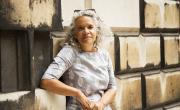




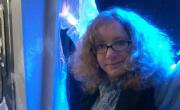



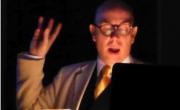
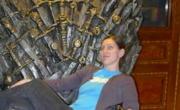
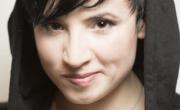





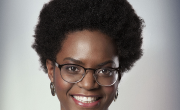


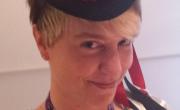
%2035f575.jpg?itok=Xkra6fm8)
